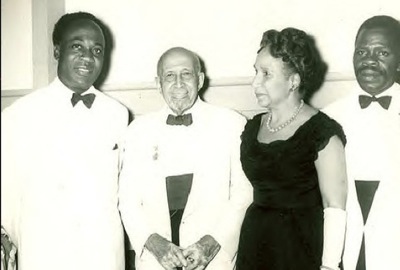Dr. Du Bois with Kwame Nkrumah and Shirley Graham in Ghana
[Review]
BARAKA’S MOST DANGEROUS MAN IN AMERICA
(W.E.B. DuBois)
Play Written by Amiri Baraka
Directed by Woodie King
Playing at Castillo Theatre 543 West 42nd Street
(212) 941-1234
Review by Ebele Oseye
On Thursday evening, 28 May 2015, history was made on 42nd Street as New Federal Theatre in Association with Castillo Theatre presented the world premiere of Amiri Baraka’s last play, Most Dangerous Man in America, a monumental work that creatively recounts the Federal indictment of W.E.B. DuBois at age 83.
“Blessed are the peacemakers,” are the first words we hear from Dr. DuBois in the opening speech of the play. Early in the first scene we learn the “reason” for the indictment: DuBois’ support for world peace. The absurdity of this idea takes on added meaning during a week which also saw a celebration of Memorial Day which brought us face to face with the terrors of war. “War is murder, force, anarchy and debt,” DuBois says in Black Reconstruction. How many veterans are homeless? How many suffer depressions that lead to daily deaths, including their own?
Dr. DuBois, mentor of Harlem Renaissance writers, among the founders of the NAACP, author of more than twenty books, historian, humanitarian, editor of the Crisis for twenty-three years world renowned and revered, is as journalist Herb Boyd says, our Patriarch.
In this time of great remembering, fifty years since the death of Malcolm X, fifty years since the march from Selma to Montgomery, one hundred and fifty years since the end of the civil war, it is good to remember Dr. DuBois who fought tirelessly for social justice.
Most Dangerous Man in America connects us to men of different generations and different temperaments. Individually DuBois and Baraka possess formidable intellectual powers. Together they are the two that can put ten thousand to flight.
This play could not be more timely as demonstrations across the country continue to insist that all life is sacred. Both Art McFarland as Dr. DuBois and Petronia Paley as Shirley Graham present their complex and complicated characters with a compelling conviction.
We feel Baraka’s sharpest wit in the delivery of Michael Basile as Vito Marcantonio, defending lawyer for Dr. DuBois. It is one of many moments when we hear the playwright’s voice so clearly and we experience a deep nostalgia. Where Amiri Baraka has a hand in writing a play, one must expect a merciless humor to be delivered with the larger truth.
The themes of beauty and joy are repeated throughout the play. Everyone looks so elegant. There is Sheba’s Beauty Parlor and a Harlem barbershop. There are women in hats and gloves and fine fitted dresses. In an article published in the National Guardian, May 23rd 1960, entitled “A Program of Reason, Right and Justice for Today” Dr. DuBois closes with the mandate: “Preserve the utmost freedom for dream of beauty, creative art and joy of living”(Page 428 the W.E.B. DuBois Reader, Ed. David L. Lewis)
The “Today” of the article is the present day. Beauty, a constant in this play, is no minor consideration. Beauty is an “utmost” component of freedom.
The international audience on opening night, some under thirty, most older, entered the theater with high expectations and no one was disappointed. Director Woodie King creatively used the challenges of a modest space to transport the audience to a larger world stage: Harlem, Washington, D.C., Ghana, and China. With a single fancy chair placed audience stage left, we have a Harlem beauty parlor, alive with bright, mischievous, maternal energies.
On the right, during another scene, we have the barbershop, charged with masculine energies, and the radio. Stage hands had to work efficiently and quickly to organize these rapidly changing scenes — a part of the chaotic disorder evoked by an arrest coming after as DuBois is in the midst of an incomprehensible grief following the death of his first wife, Nini, after fifty-five years of marriage.
There is an outcry on stage in the moment when the officer attempts to handcuff Dr. DuBois. A silent tension which claims the audience almost screams “Black Life Matters”!
This play presents a dramatic intersection of beauty and terror highlighting the joyful 1951 marriage of Dr. W.E.B. DuBois to his second wife, Shirley Graham and in the same year his terrifying indictment by the Federal government. Six years after the trial, in 1957, Ghana regained independence and President Kwame Nkrumah offered Dr. DuBois a home where he could live with dignity in the closing years of his life.
You will fall in love with the joyful cast of eighteen. The smooth lover. The black police officer. Dressed in Harlem’s stylish clothes or Ghana’s brilliant cloth, in speeches or in the fine body-shaking dances from both sides of the ocean, they offer counterbalance to mindless, relentless political oppression which identifies a peacemaker as a criminal. The Harlem community carefully monitors the news regarding the trial of Dr. DuBois.
Fifty years ago, another peacemaker, Dr. King, said this about segregation in a speech at the end of the march from Selma to Montgomery: “They segregated southern money from the poor whites; they segregated southern mores from the rich whites; they segregated southern churches from Christianity; they segregated southern minds from honest thinking; and they segregated the Negro from everything.”
During intermission and at the conclusion of the play , the theater was alive with conversations. There were no strangers in this multi cultural audience “I’m coming again and I’m going to bring a young person,” one woman said, ” I want him to know this history.”
There is the triumph of the spirit, especially when Dr. DuBois makes a connection with the younger generation, literally handing his walking stick to a young man, then delivering the wisdom which will carry him through life. Seek the beauty of life, experience the joy and be less focused on attaining monetary wealth.
Amiri Baraka’s Most Dangerous Man in America (W.E.B. DuBois) will be at the Castillo Theatre on 42nd Street through June 28, 2015. This is an invaluable opportunity to reconnect to inspiring history, reconnect to reason and honest thinking.
As the Schomburg Center for Research in Black Culture celebrates its 90th anniversary, let young people experience the legacy of Dr. W.E.B. DuBois, humanitarian, historian, citizen of the world. Peacemaker.












